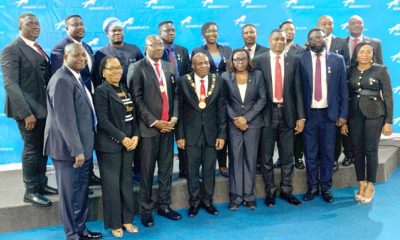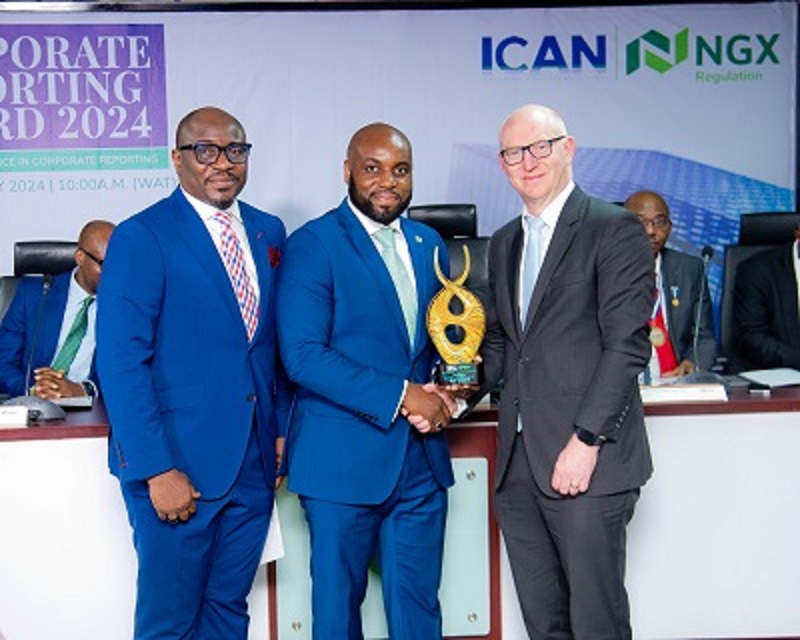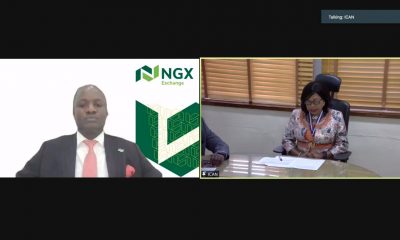Economy
Expert Highlights Vital Skills Accountants Must Acquire

An expert in the accounting profession, Mr David Lyford-Smith, has advised accountants in Nigeria to acquire some certain skills if they intend to remain highly competitive in the future.
Mr Lyford-Smith, the Technical Manager in the Tech Faculty of the Institute of Chartered Accountants in England and Wales (ICAEW) said at the 49th Annual Accountants Conference organized by the Institute of Chartered Accountants in Nigeria (ICAN) that one of the skills is adaptability.
He said the adaptability skill was needed by accounting professionals considering how technology has taken over the profession, explaining that professionals need to adapt to changing standards in the industry, especially as it adjusts to emerging technology. He noted that the accounting profession was already reacting by creating exams and learning materials to produce knowledgeable newly-qualified accountants.
While presenting his paper at the plenary session titled Disruptive Innovations: Challenges and Opportunities in the Accounting Profession, Mr Lyford-Smith said, “Nigeria has a young and growing accountancy profession and this means there is a huge opportunity for students and current accountants to be trained today for the needs of the near future. In the very near future, the number one skill for accounting will be adaptability.
“Accountants won’t have to be technologists but must be able to talk to them; they need to be able to meet in the middle.
“These effects are already being felt. The Big 4 – KPMG, Ernst & Young (EY), Deloitte and PwC- are already struggling to keep their juniors occupied while teaching them the basics.”
At the conference held at the International Conference Centre, Abuja between September 9 and 13, 2019 and themed Building Nigeria for Sustainable Growth and Development, Mr Lyford-Smith said other skills to acquire were statistical thinking and understanding data.
“Understanding statistical thinking is a key skill for auditors interpreting analytics data. Software may be able to process huge amounts of information, but interpreting the results correctly means taking a sceptical interpretation and understanding concepts such as margins of error, outliers, sampling bias, and so on.
“Accountants still need to be able to prioritise useful tests above interesting ones and be able to tell the difference,” he added.
Speaking on the transformational trends in accounting aptly referred to as the ‘ABCDs of accounting technology’, Mr Lyford-Smith explained that these have been the focus of the ICAEW’s tech work over the last couple of years.
The ABCDs of accounting technology are artificial intelligence (AI), blockchain, cybersecurity and data, saying, “Once accountants adapt to changing trends, they will realise how much time and resources can be saved.”
For instance, AI involves automating even non-repetitive tasks, replicating accountants’ intuition and turbo-charging accountants’ judgment. With blockchain, there is no need to reconcile books, although the accountant will still need to assess the economic value of assets,” he added.
The Editor and Blogger, Mr Lyford-Smith on ICAEW’s Excel Community however noted that cyber risk was high but explained that there was a need for new controls around detection, response and resilience.
With the recent focus on Big Data, new sources of non-financial data are available to provide hard evidence for decisions, identify how data supports specific decisions and provides value, as well as check the integrity and quality of new sources of data.
The Excel specialist, who has strong interest in digitalization of taxes, emphasized that technology was important for audit and taxation, as it provided simplification and could be tailored according to each country’s specific circumstances.
He disclosed that the ICAEW’s Digital Tax report looked at how tax authorities in 12 countries – including Nigeria – are making use of the opportunities to improve efficiency and reduce compliance costs.
Economy
NGX RegCo Cautions Investors on Recent Price Movements

By Aduragbemi Omiyale
The investing public has been advised to exercise due diligence before trading stocks on the Nigerian Exchange (NGX) Limited.
This caution was given by the NGX Regulation Limited (NGX RegCo), the independent regulatory arm of the NGX Group Plc.
The advisory became necessary in response to notable price movements observed in the shares of certain listed companies over recent trading sessions.
On Monday, the bourse suspended trading in the shares of newly-listed Zichis Agro-allied Industries Plc. The company’s stocks gained almost 900 per cent within a month of its listing on Customs Street.
In a statement today, NGX RegCo urged investors to avoid speculative trading based on unverified information and to consult licensed intermediaries such as stockbrokers or investment advisers when needed.
It explained that its advisory is part of its standard market surveillance functions, as it serves as a measured reminder for investors to prioritise informed and disciplined decision-making.
The notice emphasised that the Exchange will continue to monitor market activities closely in line with its mandate to ensure a fair, orderly, and transparent market.
“NGX RegCo encourages all investors to base their decisions on publicly available information, including a thorough assessment of company fundamentals, financial performance, and risk profile,” a part of the disclosure said.
It reassured all stakeholders that the NGX remains stable, well-regulated, and resilient, saying the platform continues to foster an environment where investors can participate with confidence, supported by robust oversight and transparent market operations.
“Our primary responsibility is to maintain a level playing field where market participants can trade with confidence, backed by timely and accurate information.
“This advisory is a routine communication, reinforcing that sound fundamentals, not speculation, remain the foundation for sustainable investment outcomes. We are fully committed to preserving the integrity and stability of our market,” the chief executive of NGX RegCo, Mr Olufemi Shobanjo, stated.
Economy
Stronger Taxpayer Confidence, Others Should Determine Tax Reform Success—Tegbe

By Modupe Gbadeyanka
The chairman of the National Tax Policy Implementation Committee (NTPIC), Mr Joseph Tegbe, has tasked the Nigeria Revenue Service (NRS) to measure the success of the new tax laws by higher voluntary compliance rates, lower administrative costs, fewer disputes, faster resolution cycles, and stronger taxpayer confidence.
Speaking at the 2026 Leadership Retreat of the agency, Mr Tegbe said, “Sustainable revenue performance is built on trust and efficiency, not enforcement intensity,” emphasising that the legitimacy and predictability of the system are more critical than punitive measures.
He underscored that the country’s tax reform journey is at a critical juncture where effective implementation will determine long-term fiscal outcomes.
The NTPIC chief stressed that tax policy must serve as an enabler of governance, and should embody simplicity, equity, predictability, and administrability at scale.
These principles, he explained, foster voluntary compliance, reduce operational friction, and strengthen investor confidence. He warned that ad-hoc adjustments or policy drift could undermine reform momentum, unsettle businesses, and deter investment, which thrives on predictable rules rather than shifting announcements. Structured sequencing, clear transition mechanisms, and continuous feedback between policymakers and administrators are therefore critical to sustaining reform credibility.
Mr Tegbe further argued that revenue reform cannot succeed in isolation. Achieving sustainable gains requires a whole-of-government approach, leveraging robust taxpayer identification systems, integrated financial data, efficient dispute resolution, and harmonised coordination across federal and sub-national levels. This approach, he said, reduces leakages, eliminates multiple taxation, and reinforces confidence in the system.
He noted that the passage of four new tax laws marks only the beginning of a broader reform agenda, describing the initiative as a systemic recalibration of Nigeria’s fiscal architecture, rather than a routine policy update.
He further asserted that the true measure of success will be the credibility of implementation, not the design of the laws themselves.
The NRS, he noted, functions as the nation’s “Revenue System Integrator,” with outcomes reflecting the strength of an interconnected ecosystem that encompasses policy clarity, enforcement consistency, digital infrastructure, dispute resolution efficiency, and intergovernmental coordination.
Economy
NUPENG Seeks Clarity on New Oil, Gas Executive Order

By Adedapo Adesanya
The National Union of Natural and Gas Workers (NUPENG) has expressed deep concern over the Executive Order by President Bola Tinubu mandating the Nigerian National Petroleum Company (NNPC) Limited to remit directly to the federation account.
In a statement signed by its president, Mr William Akporeha, over the weekend in Lagos, the union noted that the absence of detailed public engagement had naturally generated tension within the sector and heightened restiveness among workers, who are anxious to know how the new directive may affect their employment, welfare and job security, especially as it affects NNPC and other major operations in the oil and gas sector.
It pointed out that the industry remained the backbone of Nigeria’s economy, contributing significantly to national revenue, foreign exchange earnings, and employment.
The NUPENG president affirmed that any policy shift, particularly one introduced through an Executive Order, has far-reaching consequences for regulatory frameworks, Investment decisions, operational standards, and labour relations within the sector.
According to him, “there is an urgent need for clarity on the scope and objectives of the Executive Order -What precise reforms or adjustments does it introduce? “Its implications for the Petroleum Industry Act -Does the Order amend, interpret, or expand existing provisions under PIA?
“Impact on workers and existing labour agreements-Will it affect job security, conditions of service, Collective Bargaining agreements or ongoing restructuring processes within the industry? “Effects on indigenous participation and local content development -How will it affect Nigerian companies and employment opportunities for citizens?”
He warned that without proper consultation and explanation, misinterpretations of the Executive Order may spread across the industry, potentially destabilising operations and undermining industrial harmony that stakeholders have worked hard to sustain.
“Though our union remains committed to constructive engagement, national development and stability of the oil and gas sector, however, we are duty-bound and constitutionally bound to protect the rights and welfare and job security of our members whose livelihoods depend on a clear, fair and predictable policy framework,” Mr Akporeha further stated.
-

 Feature/OPED6 years ago
Feature/OPED6 years agoDavos was Different this year
-
Travel/Tourism10 years ago
Lagos Seals Western Lodge Hotel In Ikorodu
-

 Showbiz3 years ago
Showbiz3 years agoEstranged Lover Releases Videos of Empress Njamah Bathing
-

 Banking8 years ago
Banking8 years agoSort Codes of GTBank Branches in Nigeria
-

 Economy3 years ago
Economy3 years agoSubsidy Removal: CNG at N130 Per Litre Cheaper Than Petrol—IPMAN
-

 Banking3 years ago
Banking3 years agoSort Codes of UBA Branches in Nigeria
-

 Banking3 years ago
Banking3 years agoFirst Bank Announces Planned Downtime
-

 Sports3 years ago
Sports3 years agoHighest Paid Nigerian Footballer – How Much Do Nigerian Footballers Earn





















